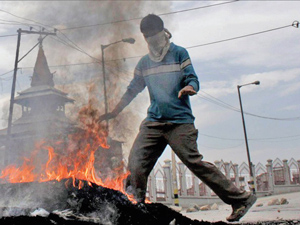Why Isn't Bahrain Being Bombed?
By Bill Fletcher, Jr. -Guest Columnist- | Last updated: Jun 6, 2011 - 4:03:19 PMWhat's your opinion on this article?

Protester in Bahrain. Photo: MGN Online
It is because of the history of U.S. hypocrisy that we should always be skeptical when ANY U.S. administration suggests that it is intervening in some other country due to humanitarian reasons. |
Ok, think about it for a moment. Here's the second part of the question. Why are we threatening Syria, but remaining curiously quiet about Bahrain and Yemen? There is a major crackdown going on in Syria. It is being carried out by a very undemocratic government, but it is an internal matter. There are voices in the U.S.A. that are suggesting that military action be taken against Syria.
Yet, no action has been taken against Bahrain (or Yemen for that matter where repression has been underway). In case you have not been following this story, a pro-democracy movement emerged in Bahrain challenging the Sunni clique running the country where there is a Shia majority. The movement has faced massive and brutal repression, including the introduction of Saudi Arabian troops. Most recently doctors and nurses who treated pro-democracy demonstrators were arrested for treating these demonstrators.
And, the U.S. government has been largely silent.
The hypocrisy here is not surprising, but nevertheless disgusting. Both Bahrain and Yemen are key allies of the U.S.A. So, the script seems to be that they can get away with whatever level of repression they choose, whereas in situations where there is a country with either a less reliable ally (Libya's Gadhafi) or a contentious near enemy (Syria's Assad), it is fine to either militarily intervene or to at least wave the threatening sword.
It is because of the history of U.S. hypocrisy that we should always be skeptical when ANY U.S. administration suggests that it is intervening in some other country due to humanitarian reasons. Unfortunately, it rarely passes the straight-face test. There is no clear criteria used by the U.S.A. as to when it chooses to intervene except the extent to which a country is an ally of the U.S.A. or not. Given this, it is far better for us to demand of the U.S. government that it defer to the direction of countries in the affected region rather than to offer us the rhetoric of humanitarianism when the objectives are more cynically geo-political or economic.
(Bill Fletcher, Jr. is a Senior Scholar with the Institute for Policy Studies, the immediate past president of TransAfrica Forum, and the co-author of “Solidarity Divided.” He can be reached at [email protected].)
INSIDE STORIES AND REVIEWS
-
-
About Harriett ... and the Negro Hollywood Road Show
By Rabiah Muhammad, Guest Columnist » Full Story -
Skepticism greets Jay-Z, NFL talk of inspiring change
By Bryan 18X Crawford and Richard B. Muhammad The Final Call Newspaper @TheFinalCall » Full Story -
The painful problem of Black girls and suicide
By Charlene Muhammad -National Correspondent- » Full Story -
Exploitation of Innocence - Report: Perceptions, policies hurting Black girls
By Charlene Muhammad -National Correspondent- » Full Story -
Big Ballin: Big ideas fuel a father’s Big Baller Brand and brash business sense
By Bryan Crawford -Contributing Writer- » Full Story






 Click Here Stay Connected!
Click Here Stay Connected!








